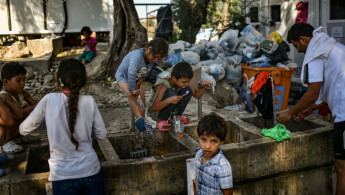'Suicide attempts' on Greek migrant island as arrivals spike
Suicide attempts have become common in overcrowded refugee camps in Lesbos.
2 min read
Moira refugee camp is "close to breaking point" (Getty)
Dismal conditions in one of Europe's largest migrant camps on the Greek island of Lesbos are leading to suicide attempts, a charity said Monday, as arrivals continued to increase.
Medical charity Doctors Without Borders (MSF) said chronic overcrowding at camps on the island, as the country grapples with the migration crisis, had led to an array of dire health consequences for those held there.
It said its teams "are seeing multiple cases each week of teenagers who have attempted to commit suicide or self-harmed, and are responding to numerous critical incidents as a result of violence, child self-harm and lack of access to urgent medical care".
"It is time to immediately evacuate the most vulnerable to safe accommodation in other European countries," the organisation said.
Government data on Monday showed there were over 11,000 refugees and migrants on Lesbos, including nearly 9,000 in the camp of Moria - almost triple the nominal capacity.
Over 320 people arrived just on Sunday, the data showed.
"I've been the first to say that conditions in Moria are close (to breaking point)," Migration Minister Dimitris Vitsas told Alpha Radio.
Vitsas on Monday said some 3,600 people had been removed from Moria since June, only to be replaced by another 5,700 arrivals.
MSF said that over 1,500 people had arrived on Lesbos in the first two weeks of September.
"With no space left, they are now sleeping without any shelter, without sufficient food and with extremely limited access to medical care," the charity said.
Most Moria residents live for months in squalid conditions while waiting for asylum applications to be processed.
In addition to frequent outbreaks of violence, rights groups say the camp sewage system has broken down, with toilet water reaching tents and mattresses where children sleep.
Conditions are so bad that even camp workers have gone on strike in protest.
Only the infirm, the vulnerable and those who receive asylum are allowed to reach the Greek mainland.
Lesbos authorities have resisted calls to create new facilities and the Greek government warns that emptying the island would threaten an EU deal with Turkey that has drastically reduced new arrivals.
Medical charity Doctors Without Borders (MSF) said chronic overcrowding at camps on the island, as the country grapples with the migration crisis, had led to an array of dire health consequences for those held there.
It said its teams "are seeing multiple cases each week of teenagers who have attempted to commit suicide or self-harmed, and are responding to numerous critical incidents as a result of violence, child self-harm and lack of access to urgent medical care".
"It is time to immediately evacuate the most vulnerable to safe accommodation in other European countries," the organisation said.
Government data on Monday showed there were over 11,000 refugees and migrants on Lesbos, including nearly 9,000 in the camp of Moria - almost triple the nominal capacity.
Over 320 people arrived just on Sunday, the data showed.
"I've been the first to say that conditions in Moria are close (to breaking point)," Migration Minister Dimitris Vitsas told Alpha Radio.
Vitsas on Monday said some 3,600 people had been removed from Moria since June, only to be replaced by another 5,700 arrivals.
MSF said that over 1,500 people had arrived on Lesbos in the first two weeks of September.
"With no space left, they are now sleeping without any shelter, without sufficient food and with extremely limited access to medical care," the charity said.
Most Moria residents live for months in squalid conditions while waiting for asylum applications to be processed.
In addition to frequent outbreaks of violence, rights groups say the camp sewage system has broken down, with toilet water reaching tents and mattresses where children sleep.
Conditions are so bad that even camp workers have gone on strike in protest.
Only the infirm, the vulnerable and those who receive asylum are allowed to reach the Greek mainland.
Lesbos authorities have resisted calls to create new facilities and the Greek government warns that emptying the island would threaten an EU deal with Turkey that has drastically reduced new arrivals.





 Follow the Middle East's top stories in English at The New Arab on Google News
Follow the Middle East's top stories in English at The New Arab on Google News
![The UAE is widely suspected of arming the RSF militia [Getty]](/sites/default/files/styles/image_330x185/public/2024-11/GettyImages-472529908.jpg?h=69f2b9d0&itok=Yauw3YTG)
![Netanyahu furiously denounced the ICC [Getty]](/sites/default/files/styles/image_330x185/public/2024-11/GettyImages-2169352575.jpg?h=199d8c1f&itok=-vRiruf5)
![Both Hamas and the Palestinian Authority welcomed the ICC arrest warrants [Getty]](/sites/default/files/styles/image_330x185/public/2024-11/GettyImages-2178351173.jpg?h=199d8c1f&itok=TV858iVg)